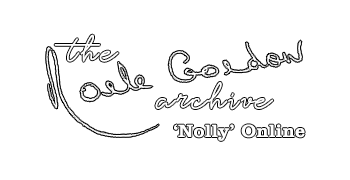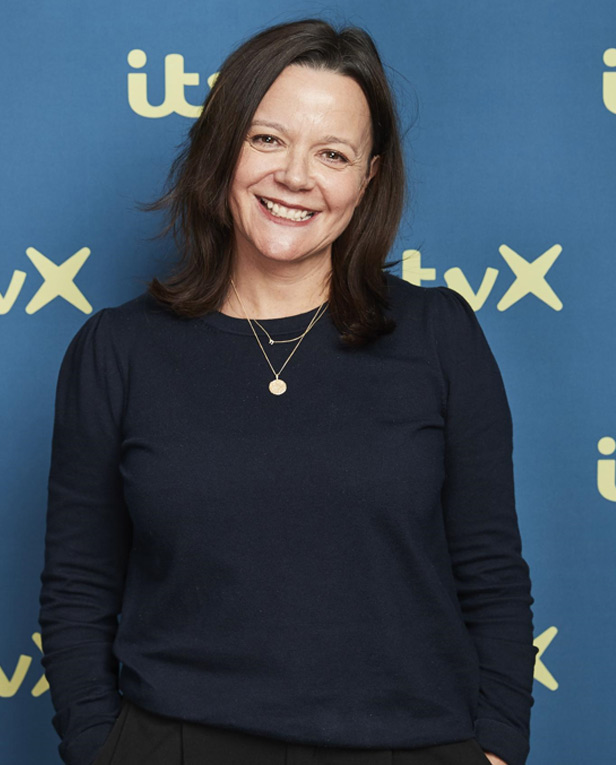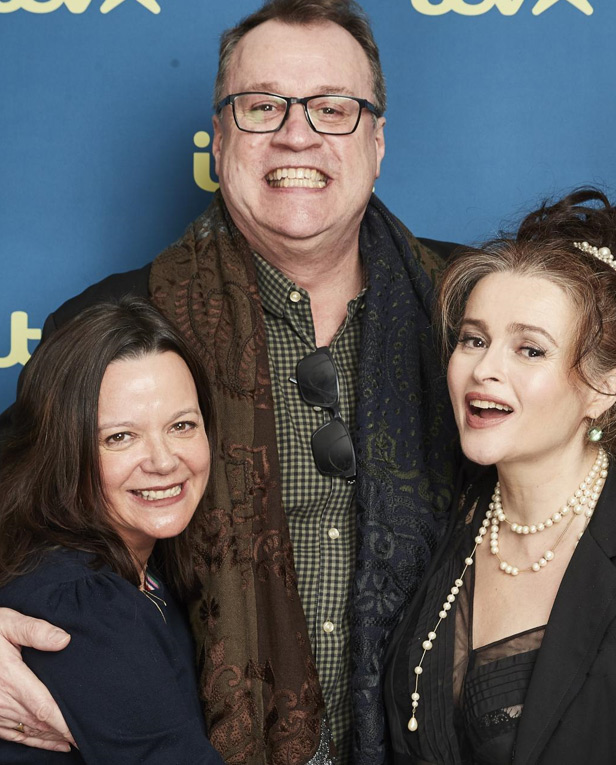
Interview with Nicola Shindler, Executive Producer Nolly
Noele Gordon is at the height of her success, with her famous soap opera Crossroads riding high in the ratings. Then she’s suddenly sacked overnight – but why? This is the core plot to Russell T Davies penned three part drama, Nolly. Nicola Shindler, Executive Producer, talks about the ITVX production looking at the life of Noele Gordon.

This is the first commission for your new production company Quay Street Production – what drew you to the project?
Anything Russell wants to do, I want to do! But, also, everything about this story works. For me, the whole idea of a woman at a certain age, being pushed to one side, not having any autonomy in her career, I think it’s really important to tell stories like this. I want Quay Street to be somewhere that you can tell really important stories, but also make them very funny and entertaining. And I think that’s what Nolly is: it’s incredibly good fun and it’s trying to say something important.
Nolly is your 11th collaboration with Russell T Davies. Can you tell us a bit about your working relationship with Russell over the years?
I think we work well together because we have a shared sense of humour, and a shared passion for television, and I am just such an admirer of his work ethic. I don’t know of anyone who works harder, and who cares more, and who has such attention to detail. I know that when I am working with Russell I have to try and be as good as he is and that is very motivational. I hope that I’ve carried that through to other shows as well, just because you can’t be anything less than your best when you’re working with Russell. We communicate very well, and I think I know what he wants when he’s not there.
Were you aware of Noele Gordon before taking on the project?
Yes, very much so! I didn’t watch a lot of Crossroads but it was always on in our house as were all the soaps. My mum really liked watching it. I remember thinking Noele Gordon was a stern old woman and of course the reality is that she wasn’t that old and definitely not stern. I was always intrigued by her because she was a proper soap icon.
Why do you think now is an important time to be telling this story, 40 years after the time in which it’s set?
Well, it’s a story that’s never been told and I think it’s a really important story to tell. And I think that’s always fascinating. The idea that this woman was treated so badly, and was never given a reason for it. Then she faced the tragedy that she was never at those heights of fame again. At no point did she do anything wrong!.
As with It’s A Sin (your previous project with Russell and Peter) – despite being a period piece, the show feels incredibly resonant and timely. Why do you think that is?
In a post-MeToo world, where the way women are treated in the workplace is more closely examined, it feels like now is the right time to look at this story. 10 or 15 years ago, you may have thought “oh, she’s just a really difficult, challenging woman” and that would have explained why the treatment of her. But now, rightly, we look for more context and more understanding of women like Nolly, the societal roles they are put in and how they got to be as successful as they were.
And that’s what makes it feel really contemporary I think, seeing Nolly through this modern lens. I think she was a complex woman, which is great, and I also recognise that she was also no angel too. She was ambitious, but not a bad person. And I think examining the differences in how we perceive women between now and then make this a really resonant drama – as does the similarities in the challenges women face too.

It’s also a TV series about television isn’t it?
One of the great things is how this series looks at how storytelling can impact on the audience. It’s fascinating. Russell’s written a couple of brilliant scenes where you really understand the impact that soap and the characters have on an audience. And how much investment there is in those characters and how important television is to people, because it’s always there, in your home. And I think that even with television changing, and with streaming becoming more prevalent, that shouldn’t be forgotten. Unlike theatre or cinema, with television people invite us into their home. And as a result they feel like they have a right to talk about television in the way they may not do about other art forms. And I really like that, I appreciate that. I think it makes us better because we have such an invested audience.
Nolly explores the treatment of a woman working in a very male-dominated industry. Are there any parallels you recognise working in the same industry?
When I came into the industry, there were very few female producers. It was mostly female scriptwriters. But I came in at a time when the industry was opening up. As a result, I didn’t have any personal struggles or people to push against, just because I was a woman. But I have spoken to other women who did face that, and I didwitness things at the time, which showed how difficult it could be for women in this industry. But I do think the times have changed, and I do think we’re a little bit more open now. I don’t think it’s completely resolved, and I think things are still said about women who have lots of authority which wouldn’t be said about men.
How did you feel when Helena Bonham Carter was cast in the role of Nolly?
Absolutely delighted! Noele Gordon was such an imposing presence – she was called the “Queen of the Midlands”, she was almost regal. Nolly carried a certain charisma with her when she walks into a room and I think we needed someone who was a star in their own right to bring that kind of authority, charm and sophistication, and to be the centre of attention. Helena Bonham Carter is a lovely woman and doesn’t draw attention to herself, but she’s just got that same star quality.
How did you feel seeing the cast bring to life their iconic Crossroads counterparts?
I mean, just fantastic. Chloe Harris is so brilliant in this as Miss Diane and Lloyd Griffith as Benny too – those are the two I remember most from watching in my childhood. They just inhabit the part so well. And they’re cheeky and funny, while being absolutely respectful to the characters. I also think Augustus Prew is absolutely brilliant as Tony Adams. He’s funny, he’s charming, he’s lovely. He’s so attentive.

He and Helena have such a beautiful rapport. And he never stops being funny at the same time, which is a real skill. I’d love to mention Andy Pryor as well, our casting director, who did another fantastic job. There are people in this show, who have only got one line or a handful of scenes and even they are perfectly cast. So, I’m delighted with this cast – they really, really exceeded any expectations.
Do you have a scene you are most looking forward to audiences seeing?
I can’t pick one scene, but the opening of part one of episode one is masterful. It’s such brilliant writing, and is so incredibly active, it’s a really strong opener to the series. In it we also meet Bethany Antonia, a brilliant young actress playing Poppy (a fictional character), who arrives into this environment of people who’ve been working together for 18 years.
The storytelling is so speedy, it’s so thorough, it’s so characterised, and it’s very funny as well. So it has to be that for me, it’s perfectly timed.
Nolly is available now on ITVX and the STV Player. There is also a documentary The Real Nolly, looking at the life of Noele Gordon.